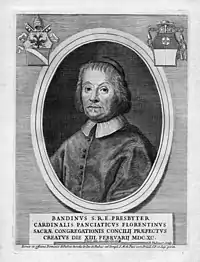Bandino Panciatici
Bandino Panciatici (10 July 1629 – 21 April 1718) as a Roman Catholic cardinal from 1690 to 1718.

Biography
Bandino Panciatici was born in Florence on July 10, 1629.[1] He came from a Pistoian noble family, and was a relative of Pope Clement IX.[1] He was educated at the University of Pisa, receiving a doctorate in law.[1]
After university, he traveled to Rome and practiced law with Giambattista De Luca.[1] When his relative became Pope Clement IX in 1667, he entered the papal household.[1] He became secondo collaterale of the Roman Curia. A short time after that, he became lieutenant of the auditor of the Apostolic Camera.[1] When Pope Clement X was elected in 1670, he resigned to respect the laws of justice (non mancare ai doveri della giustizia), returning to Florence.[1] In 1678, he was recalled to Rome by Pope Innocent XI to become secretary of the S.C. of the Apostolic Visit and of the State of Regulars.[1] He then became S.C. of Bishops and Regulars in 1686. He later became Referendary of the Tribunals of the Apostolic Signature of Justice and of Grace.[1]
On October 7, 1689, he became prodatary of the Apostolic Dataria.[1] On October 14, 1689, he became Titular Patriarch of Jerusalem, with dispensation for not having yet received Holy Orders.[1] He was consecrated as a bishop in Rome by Cardinal Gasparo Carpegna on December 21, 1689.[1] On January 25, 1690, he was named Assistant at the Pontifical Throne.[1]
The pope made him a cardinal priest at the consistory of February 13, 1690.[1] On April 10, 1690, he received the red hat and the titular church of San Tommaso in Parione.[1] He participated in the papal conclave of 1691 that elected Pope Innocent XII.[1] He was confirmed as prodatary by the new pope on July 14, 1690.[1] He opted for the titular church of San Pancrazio on August 8, 1691.[1] He became Camerlengo of the Sacred College of Cardinals in 1699, holding that office until February 3, 1700.[1] He participated in the papal conclave of 1700 that elected Pope Clement XI.[1] The new pope offered him the position of Cardinal Secretary of State, but he declined because of his age.[1] He did, however, agree to serve as prefect of the S.C. of the Tridentine Council, assuming that office on December 4, 1700.[1] He exchanged his titular church for Santa Prassede on February 19, 1710.[1]
He died at his residence, the Palazzo Bolognetti on April 21, 1718.[1] He was initially buried in San Pancrazio, but later re-interred in his family's traditional burial place, the Basilica of Santa Maria Novella in Florence.[1]
Episcopal succession
While bishop, he was the principal consecrator of:[2]
- Giovanni Matteo Marchetti, Bishop of Arezzo (1691);
- Sebastiano Perissi, Bishop of Nocera de' Pagani (1692);
- Carlo Cutillo, Bishop of Minori (1694);
- Giovanni Battista Capilupi, Bishop of Polignano (1694);
- Giovanni Battista Gentile, Bishop of Ajaccio (1694);
- Pietro Gaddi, Bishop of Spoleto (1695);
- Giuseppe Cei (bishop), Bishop of Cortona (1695);
- Domenico Belisario de Bellis, Bishop of Molfetta (1696);
- Nicolò Nardini, Bishop of Acquapendente (1696);
- Antonio Grassi, Bishop of Chioggia (1696);
- Pietro Paolo Gerardi, Bishop of Anagni (1696);
- Vincenzo Maria de Rossi, Bishop of Penne e Atri (1696);
- Lorenzo Fabri, Bishop of Fossombrone (1697);
- Giovanni Fontana, Bishop of Cesena (1697);
- Giuseppe Antonio Bertodano, Bishop of Vercelli (1697);
- Andrea Deodati, Archbishop of Rossano (1697);
- Giuseppe Rodoero, Bishop of Acerra (1697);
- Giambattista Isnardi de Castello, Bishop of Mondovi (1697);
- Domenico Pacifico, Bishop of Teano (1698);
- Bisanzio Fili, Bishop of Oppido Mamertina (1698);
- Pietro Spínola, Bishop of Ajaccio (1698);
- Philippus Albini, Bishop of Sant'Agata de' Goti (1699);
- Giovanni Dominico Tomati, Titular Bishop of Cyrene (1700);
- Ulisse Giuseppe Gozzadini, Titular Archbishop of Teodosia (1700);
- Tommaso Antonio Scotti, Archbishop of Dubrovnik (1701);
- Francesco Frosini, Bishop of Pistoia e Prato (1701);
- Orazio Maria Panciatichi, Bishop of Fiesole (1703);
- Benedetto Falconcini, Bishop of Arezzo (1704);
and the principal co-consecrator of:[2]
- Pietro Priuli, Bishop of Bergamo (1708).
References
- Miranda, Salvador. "PANCIATICI, Bandino (1629-1718)". The Cardinals of the Holy Roman Church. Florida International University.
- Cheney, David M. "Bandino Cardinal Panciatici". Catholic-Hierarchy.org. Retrieved June 16, 2018. [self-published]
External links and additional sources
- Cheney, David M. "Patriarchate of Jerusalem {Gerusalemme}". Catholic-Hierarchy.org. Retrieved June 16, 2018. (for Chronology of Bishops) [self-published]
- Chow, Gabriel. "Patriarchal See of Jerusalem (Israel)". GCatholic.org. Retrieved June 16, 2018. (for Chronology of Bishops) [self-published]
| Catholic Church titles | ||
|---|---|---|
| Preceded by Egidio Colonna |
Titular Patriarch of Jerusalem 1689—1690 |
Succeeded by Niccolo Pietro Bargellini |
| Preceded by Gregorio Giovanni Gasparo Barbarigo |
Cardinal-Priest of San Tommaso in Parione 1690—1691 |
Succeeded by Innico Caracciolo (iuniore) |
| Preceded by Antonio Pignatelli del Rastrello |
Cardinal-Priest of San Pancrazio 1691—1710 |
Succeeded by Damian Hugo Philipp von Schönborn Bushein |
| Preceded by Domenico Maria Corsi |
Camerlengo of the Sacred College of Cardinals 1699—1700 |
Succeeded by Giacomo Cantelmo |
| Preceded by Fabrizio Spada |
Cardinal-Priest of Santa Prassede 1710—1718 |
Succeeded by Francesco Barberini (iuniore) |